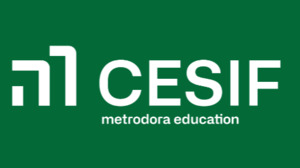
The main objective of CESIF is to furnish highly specialised professional training for the different technical and managerial positions offered by companies, enhancing our educational offering with thorough and personalised preparation for the job search and professional advancement.
The program is designed to meet the diverse needs of professionals within this dynamic and highly regulated sector.
Offer solid specialised technical and scientific training for professional development in the functional areas of the pharmaceutical and parapharmaceutical sectors.
Prepare competent professionals to thrive in a progressively challenging and intricate global environment. By seamlessly integrating into various fields of operation, professionals can pursue their goals of performance and operational excellence.
Accelerate the professional career and development of our students on their way to occupying leading roles in the different pharmaceutical, biotechnological and medical device companies.
1. Pharmaceutical sector overarching view
Types of companies in the pharma sector
Organization of pharmaceutical companies.
Professional profiles in the pharmaceutical industry.
Business Development, Marketing, department functions, Regulatory, Medical Affairs, Manufacturing, Quality Control, Quality Assurance, Finances, etc.
Pharmaceutical technology introduction
Qualified Person responsibilities.
Legal qualifications and licenses.
Traceability and distribution.
Medicines advertising/publicity regulations.
Export and importation of medicines.
End of module practical exercise
2- Pharmaceutical Quality System.
Good Manufacturing Practices regulation.
Laboratory authorization by health authorities
inspection.
ICH Q8. Pharmaceutical Development & Quality by Design.
ICH Q9. Risk Management.
ICH Q10. Pharmaceutical Quality System.
ISO 9001 Quality System.
Personnel training and job descriptions.
Documental Management.
Deviations, out of specifications and corrective/
preventive actions system.
Complaints handling and batch recall management.
Quality audits and suppliers qualification.
Quality Continuous Improvement.
Good Distribution Practices.
End of module practical exercise.
3. Quality Control.
Good Laboratory Practices.
Laboratory areas design.
Pharmacopeias.
Retention and reference samples.
Investigation of out of specification results.
Stability studies.
Environmental control.
Microbiological laboratory.
End of module practical exercise.
4. Industrial Processes.
Manufacturing facilities design.
Facilities and equipment qualification.
Utilities qualification.
Manufacturing process validation.
Instrument calibrations.
Computer systems validation.
Solid forms manufacturing principles.
Liquid and semi-solid forms manufacturing principles
Sterile manufacturing principles.
Cleaning validation.
Statistical Process Control.
Production Direction.
Integrated Production Planning.
End of module practical exercise
5. Health Authorities relationship.
European Medicines Agency (EMA). Responsibilities and organization.
Spanish Medicines and Medical Devices Agency (AEMPS).
United States Food and Drug Administration.
Responsibilities and organization.
6. Regulatory Affairs.
Post-marketing activities.
Cosmetic products informative expedients and cosmetovigilance.
Medical Devices and Combination Products.
Commercialization and advertisement of medical devices.
Dietary products.
End of module practical exercise.
7. Medicines Safety and pharmacovigilance.
Pharmacovigilance regulation.
Safety in Clinical Trials.
Side effects surveillance and reporting.
Aggregate reports (PSUR, ACO, DSUR).
Veterinary pharmacovigilance.
End of module practical exercise.
8. Clinical Investigation.
Clinical Trials and Good Clinical Practices.
Design of Clinical Trials.
Clinical Trials monitoring
Administrative management of Clinical Trials.
Activities and responsibilities of Medical Affairs.
End of module practical exercise
9. Market Access and Pharmaeconomy.
Pricing.
Functions and responsibilities of Market Access.
Market Access strategy.
Economical assessment of health interventions.
Therapeutic market positioning.
Market Access planning.
Administrations relationship.
End of module practical exercise.
10. Professional Development.
Personal Branding.
Communication skills.
Teamwork, collaboration and time management.
Creativity and problem solving
Students who successfully complete the Master’s Degree (resolution and delivery of all the practical cases proposed and completion of the Final Master’s Degree Project with pass mark) will receive the corresponding diploma of the Master’s Degree in the Pharmaceutical and Parapharmaceutical Industry of CESIF.
Professionals seeking to advance their careers within the pharmaceutical industry. It caters to individuals already working in the field, as well as recent graduates aspiring to pursue a career in pharmaceuticals.
Otros cursos